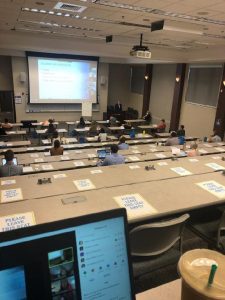
Our 1st year residential students gather for a socially distanced orientation.
This weekend, I had the pleasure of traveling to our nation’s capital city for a few days. While in Washington D.C., I toured the monuments honoring historical figures and events and gazed at the many important buildings that offer space for decision-makers.
The most impactful moment of the trip was paying my respects to the former Supreme Court Justice, Ruth Bader Ginsburg. Her casket was on display for public viewing on the steps of the Supreme Court building. The line to walk up the steps for a closer viewing weaved back and forth along First Street for a few blocks.
Across the street from the Supreme Court building, many individuals left flowers, gifts, notes, and signs expressing their gratitude for her legacy and the difference she made in their life. While the emotions of the environment still had an element of sorrow, reading the notes and experiencing the incredible outpour of love left me with hope.
Ruth Bader Ginsburg dedicated her life to public service. She was motivated by her passion of fighting and protecting the rights of the most vulnerable. In our MPA classes, we discuss the power of public service motivation. RBG’s life and legacy is a testament to that power.

Our 1st year residential students gather for a socially distanced orientation.
Hi again,
With the beginning of a new academic year comes new experiences and people. This is particularly true for the MPA program’s first-year ‘residential’ students (residential being in quotation marks due to the ongoing pandemic which is keeping us from being truly in-person), which is why I wanted to take some time to introduce you to this cohort.
The incoming class is one of the largest and most diverse that the residential program has welcomed in years, with 28 students joining UNC’s MPA network exemplifying various academic backgrounds and career interests. The cohort is representing 18 different undergraduate institutions including, UNC-Asheville, N.C. State University, Vanderbilt, Clemson, University of Kansas, and others. To accompany these undergraduate institutions, these individuals are bringing a wide variety of academic backgrounds to the classroom with undergraduate degrees in Political Science, Sociology, Psychology, Sport and Entertainment Management, Civil Engineering, Physics, Philosophy, and more.
While there is a large number of students joining the program from various undergraduate universities, another interesting characteristic of this class is that it contains our largest number of graduates from UNC-Chapel Hill. We have 9 students who are continuing their time as a Tar Heel in this cohort. Among the nine, 3 students are pursuing the Environmental dual degree that UNC offers. In looking at North Carolina as a whole, there are 12 additional students continuing their education within the program after receiving their undergraduate degree from an in-state institution.
Along with the rich amount of in-state representation in this cohort, there is significant number of students welcomed to the program from outside of North Carolina. Roughly a third of this cohort consists of out-of-state students. These individuals are bringing their passions from states such as Florida, Georgia, Kansas, Massachusetts, Pennsylvania, South Carolina, and Virginia.
While this semester looks a little different due to COVID-19, we are so proud of how well the first-year students are transitioning into this virtual learning environment. With most of the students averaging over three years of professional experience already, the passion and motivation for public service is tangible among this cohort. We are very happy to have these students providing insight from their experiences to make this program more enriching.
On behalf of the MPA Class of 2021, I would like to officially welcome each student of the first-year cohort to Carolina MPA. We are looking forward to providing support and getting to know each of you as we continue this year together! Remember that you have a purpose for being in this program, so let your values and passions guide you and you will make an impact!
Hi everyone!
My name is Clay Fleming and I am a second-year student in the residential MPA program here at the UNC School of Government. As we continue these blogs, I hope to provide a closer look at the student experience within the program, as well as offer some insight into the incredible work others with a MPA degree are accomplishing in their communities. In my first blog, I am going to share a little about myself and the path I took to arrive here at UNC.
My journey to the MPA program was different but not too out of the ordinary. While pursuing my bachelor’s degree at Appalachian State University, I was heavily involved in a community service organization called Appalachian & the Community Together (ACT). In this organization, I helped provide community volunteer opportunities to students at Appalachian State as well as lead service trips to different communities across the country. Through my involvement, I began to realize I have a passion for serving communities.
This realization was made even clearer during my senior year, when I had the opportunity to lead a community service trip to San Francisco. The group I was leading worked with three non-profits in the Bay Area, all of which discussed working with local government to create ordinances that were mutually beneficial for the non-profit and San Francisco residents. Through witnessing the direct impact these partnerships had on the community, I realized I wanted this to be my career. The next day, I found UNC’s MPA website, read about the program’s focus on both non-profits and local government and I was sold!
Once I started the residential program last fall, I began to see all of the different avenues this degree could take me. Prior to starting the MPA degree, I never gave much thought to working in local government as a career, as I was set on working for a non-profit. However, with local government being the strong point of the program, my interests were ignited. Over the summer, I had my first authentic exposure to life working in a municipality through my Professional Work Experience (PWE) with the Town of Holly Springs. While interning there, it was incredible to see the inner workings of the government body to support residents, especially during COVID-19.
Ultimately with my MPA degree, I hope to create positive social change in the world that includes an emphasis on social equity. Whether my career leads me to local government or the non-profit sphere, I want to continue my passion for strengthening communities and serving people. I am very thankful for the opportunity to pursue this career and the support this program offers to me and my peers. I look forward to regularly updating you on various topics and happenings within public administration.
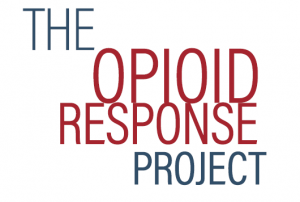
On Day 1, the public forum, things went forward nearly seamlessly in our virtual environment. SOG faculty and staff presented on collective impact, summarized two-year project, and facilitated excellent break-out sessions with team members who had expertise on topics like transportation, housing, and employment and recovery courts. There were some hiccups with the keynote speaker, Sam Quinones, the author of the highly acclaimed book Dreamland. As a journalist, he had a specific perspective of the opioid crisis, which did not always mesh with the experience and expertise of these community teams. For example, he spent over five minutes talking about how the word “addict” should be used to describe people who use drugs or who have Substance Use Disorder (SUD), despite the fact that community members in the chat attested that it was stigmatizing language. Despite these issues, the first day was a great spotlight of the project as a whole.
The second day of the forum was a teams-only event, summarizing the results of their efforts in 5-minute presentations, as well as workshops to focus on their sustainability and further work moving forward. Although there were some minor technical problems with showing some of the first presentations, these were ironed out as the day went on. Teams praised each other’s accomplishments and videos, which allowed them to make even more connections among communities using similar strategies. The teams were also able to use breakout rooms to discuss public values, collective impact, sustainability, and more, and then debrief with SOG faculty as facilitators. It was not the ending that partners may have wanted; their work, and the forum itself, were greatly complicated by the COVID-19 pandemic. However, it seemed like a fitting celebration of the teams themselves, one of the ways that ncIMPACT is managing the end of such a momentous and publicly-involved project.
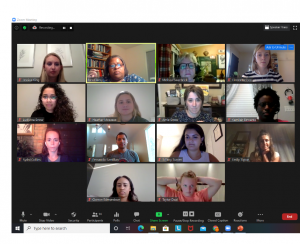
Some of our August 2020 new students start their first class
What do a Director of Community and Economic Development for a California city, a Marketing Manager for BNSF Railway in Texas, and a Corporate Social Responsibility Coordinator at Lenovo in Raleigh, NC have in common? All 3 of them began the online format of the Masters of Public Administration program at UNC Chapel Hill yesterday! They joined 11 other exceptional students to embark on a journey that provide them with a valuable skillset to take with them wherever they serve.
We want to introduce and welcome all 14 of our new August online students to the program! We could not be happier with the breadth of experience and their individual areas of interest which will bring so much to the learning environment. Among the other students in the cohort are an Animal Rights Advocate, a Higher Education Administrator at Appalachian State University, a project manager at the Federal Reserve Bank of Richmond, and a freelance Videographer/Story Creator for non-profits in California.
Our cohorts always bring together students with a broad array of backgrounds and demographics. This cohort is no exception. We’d like to highlight a few of them here:
As my PWE enters its final few weeks, I have been working on finishing several long-term projects, including the presentations for the Opioid Response Project that I spoke about last week. My other major product for that project has been the Online Resource Library that will be put up on its current microsite, and eventually the permanent website that will launch sometime in late fall or early winter. This library contains well over a hundred resources, in ten different subject areas compiled over the course of the two-year project by multiple participants, including past research assistants. Its purpose is to codify the resources created and shared by our community teams, as well as ones that would assist communities in undertaking a collective impact-style response to the opioid crisis. Although there is a guidebook in production that specifically focuses on the implementation of a collective impact project, these resources are substance use-specific, and can assist organizations who are in any stage of addressing opioids in their communities.
While working on this product, there have been many thumbs in this metaphorical pie. Since this project involved many staff and faculty members from across the SOG, it has a series of subcommittees, including one for the website. But because the project is being managed through ncIMPACT, there is an input and review process there as well. This means that I have had to manage the expectations and ideas of many individuals as I create this product, including people who have not had the chance to see the library or been involved in its compilation. Although this has at times made creating this resource more difficult, it has also raised useful questions about its purpose, format, and realistic usefulness in the wider community. For example, these conversations led to the decision to add a brief context statement to each resource and category, so that users do not have to actually click on or read the resource in order to see if it is useful to them. This made the library a much more time-intensive product for me, but will also make it much more helpful to the public audience it is meant to serve.
Creating products for a general audience is something that I have learned much more about during this PWE experience. I have been involved in academia for almost seven years now, and see it as my future career. My perspective, writing, and priorities often reflect that bias. Although I realize the importance of public-focused work, I have traditionally felt uncomfortable creating resources for this audience. How was I supposed to know what people wanted or needed? How was I, with an outsider’s perspective, going to be able to create something that would assist communities in a real, tangible way? Working with ncIMPACT has given me a much more nuanced perspective of making research and project results accessible to those who they affect most. I still know that I have an outsider’s perspective, but now I am able to speak with professionals and clients to understand how resources like this one can best support them. I am also more able to put myself into the shoes of others, and think critically about how to most efficiently communicate this information to a non-academic audience. Being able to learn more about the crossroads of policy, research, practitioners, and communities is helping me grow as a professional, and put the “social” in social worker and the “public” in public administrator.
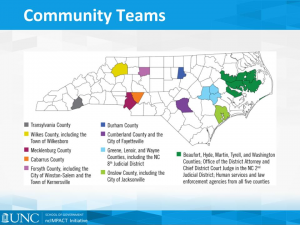
In theory, helping the teams create a 5-minute, multimedia presentation would have been fairly easy before COVID. They likely would have visited Chapel Hill during the summer for meetings, and I could have set them up for audio or video recording with professional equipment at the SOG. Worst case scenario, I may have had to make a road trip to the communities in order to co-create the presentations. However, COVID-19 has made client relationships much more complicated, especially in communities that may lack strong broadband access or public health infrastructure. Many of the individuals and organizations in the ORP are doing double duty as COVID-19 contact tracers, care providers, or policymakers. They are often extremely busy, even overwhelmed, with pandemic-related work, which makes finding time to meet difficult.
Additionally, travel restrictions and bans on in-person meetings have made all of our work on the presentations virtual. Instead of a day’s worth of recording, I have to schedule weeks of time in which I provide drafts to project managers and teams, they record audio, and I put the final products together. This has made working with clients much more difficult than it likely would have been without the influence of coronavirus. However, the teams have also expressed their gratitude for my help during this time, as they are overworked and already coping with drastic changes to in-person programs and services, including drug courts, syringe exchanges, and medical care and counseling. Although the pandemic might have made it more complicated and time-consuming, it has also taught me how to work with diverse clients virtually, and has thereby been a valuable professional experience both now and in the future.
This week was my eighth in my PWE, and I have just over a month to go to finish my MSW-required field hours, as well as my MPA program requirements. The School of Social Work field placement system relies on a thorough learning agreement and a mid-year and final competency evaluation that measures my abilities and growth throughout the placement. When completing it with my supervisor and field instructor this week, I was able to reflect on my progress, work products, and experiences with ncIMPACT so far this summer. Although I have been involved in multiple interesting projects that are expanding my hard skills, reflecting this week has allowed me to evaluate my soft skills growth, as well.
The MPA PWE process is meant to place students in outside organizations not only to help us learn about public administration, but also to help us grow as professionals. I have traditionally struggled, in personal, professional, and academic contexts, with saying no and managing my workload so that I have a healthy work-life balance. This summer, being on multiple projects has given me a substantive workload with meaningful tasks, but has also required me to prioritize some projects over others due to deadlines, organizational importance, or other factors. Thankfully, I have had guidance from my supervisor and field instructor as I navigate establishing reasonable boundaries for myself, even if that sometimes means saying no to additional tasks that are unrelated to my main projects.
I have also been able to establish a healthy work-life balance despite the fact that working from home makes distinguishing between the two much more difficult. Encouraged by my team, I have established distinct hours during which I complete my PWE, and off hours where I don’t complete work and usually do not check my email. This is a huge shift from our suddenly remote spring semester, where I struggled with establishing a daily routine while taking classes and working from home. I have also implemented regular self-care, including (mostly digital) time with friends and loved ones, as well as leisure time to unwind. Since COVID-19 is not disappearing before August 10th, I know that creating this routine during my time with ncIMPACT will assist me in doing the same in the fall semester and beyond.
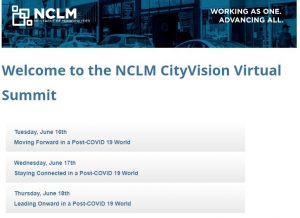
Screenshot of the NCLM virtual conference, CityVision.
This week, I was fortunate to be able to attend the NC League of Municipalities CityVision Virtual Summit, their online answer to their normal annual conference, cancelled because of COVID. I was able to hear speakers on diverse topics, including communication and emergency management, economic development for municipalities, and leadership and management during times of transition, fear, and uncertainty. The League did an excellent job of reimagining their conference content in an online format, including Zoom presentations and panels and pre-recorded lunch and learn modules that allowed attendees to learn more about very specific topics.
What stuck with me the most after attending the three-day event was that despite the incredible work that governments are doing to try to mitigate the effects of the virus, there is so much that we cannot control. Certain uncertainty, which Dr. Jim Johnson of UNC Kenan Flagler spoke about, is going to be the state of our society for the foreseeable future. Of course, this is not new; the uncertain is a part of life itself. However, the coronavirus has made this uncertainty more pronounced and powerful.
So how do we cope with this certain uncertainty? There isn’t really a clear answer. There are preparations we can make to avert a similar crisis in the future. There are relationships we can build and priorities we can reconsider in order to determine what our communities need right now. But really, we must learn to be flexible, forgiving, and empathetic in this time of severe, communal stress. And until we can all sit in slightly uncomfortable chairs and watch PowerPoints on projection screens again, at least we have virtual professional support and togetherness, thanks to Zoom and a little imagination.
Equity is a word that is floating around more in media coverage and professional discussions as Black Lives Matter protests continue this week. There are calls for dramatic policy changes to local, state, and federal governments around the issue of policing, but also other areas that can dramatically improve the lives of the historically oppressed – education, employment, social programs, and housing among them. In connection with my post last week, about making systemic change, I chose to write about a tool that can assist policymakers in creating more equitable policy, as well as an example of ncIMPACT’s current work in this arena.
One solution in the equity toolbox is to rely on data-driven policy in order to concentrate resources in the most needed areas, rather than relying on tradition or the judgment of those in power. This data does not just consist of surveys or graphs, but also listening to communities and respecting their expertise and self-determination in order to create policies and programs that fit them and their needs. Although this is often more time-intensive, policy made without the substantive participation of key stakeholders is often less effective, and may not have the intended outcomes for which it was created. ncIMPACT’s study designs often rely on mixed-methods and participatory research in order to discover needs and pilot solutions to equity-related problems, and I am fortunate to be working on several of them this summer.
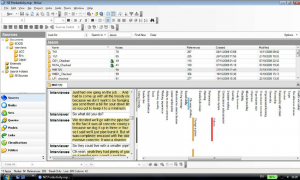
A screenshot of NVivo, the software I am using to code qualitative responses to the COVID-19 survey (Source)
One such project is the survey that ncIMPACT conducted with local government officials to discover the impact of COVID-19 on their organizations and communities and see how the School of Government can best respond. I will be completing the qualitative analysis of several open-ended questions for the 200 or so respondents from 89 NC counties. This survey will give us the chance to measure, in semi-real time, the impacts of COVID on a state-wide scale, as well as in regions with diverse economies and risk factors for the pandemic. Being able to complete work that will likely directly impact the SOG’s programs and products during this time is a very fulfilling professional experience. Although it may not directly be related to racial equity or police reform, COVID is already having disparate impacts on communities of color, which is likely to continue even after a vaccine is available. Understanding how local governments are responding, and what support they need, is a unique role the SOG can play in mitigating the negative effects of the pandemic and making North Carolina a more equitable place.